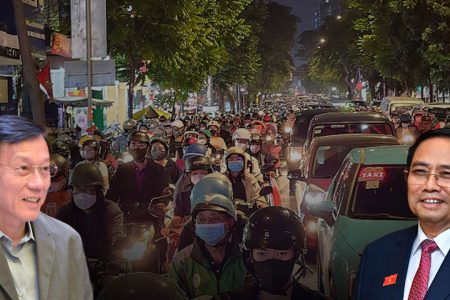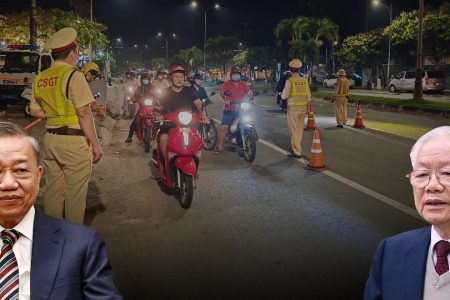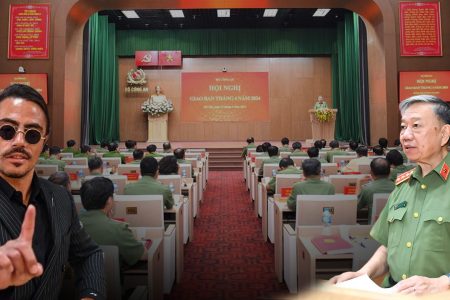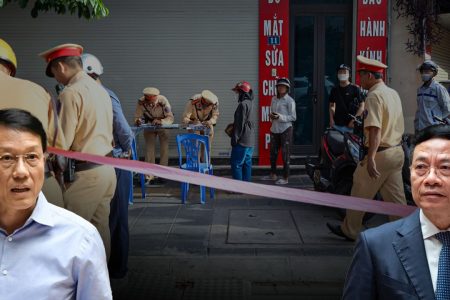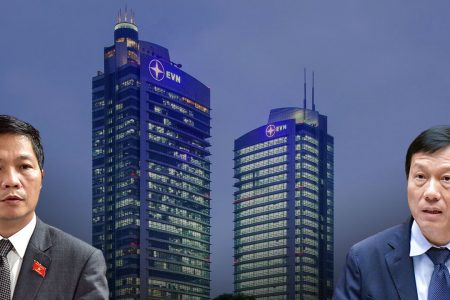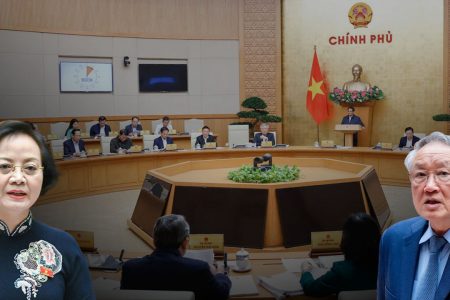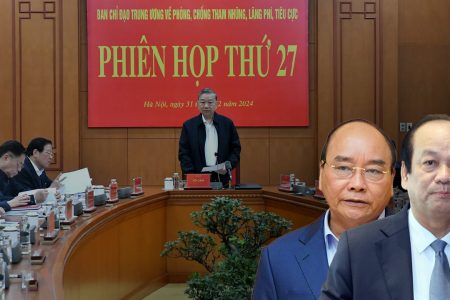
The situation of international relations and security in the East Sea (South China Sea) and Southeast Asia is suddenly hot with the continuous political and diplomatic actions from countries such as the US and Indonesia opposing China and the response quite “harsh” from China.
China dominates in the South China Sea, can Vietnam still expect the US?
Interviewing BBC News Vietnamese on June 4, 2020, Professor Nguyen Manh Hung from George Mason University (USA) and Professor Ngo Vinh Long, Chinese historian and researcher from the University of Maine talked about whether the US sending a diplomatic protest against China’s claim in the South China Sea to the UN would provide a legal “way” take the issue the Security Council.
First, Mr. Nguyen Manh Hung, in his own opinion, commented on the announcement of US Secretary of State Mike Pompeo on June 3, 2020 which said that Washington had sent a diplomatic note to the US to oppose China’s “illegal and dangerous” claim in the South China Sea.
Professor Nguyen Manh Hung: The note of the US to the Secretary-General of the United Nations for the purpose of supporting Malaysia’s position to the Continental Shelf Boundary Commission on 12 December 2019 which rejected China’s appeal on December 12, 2019, and objected to China’s claims “incompatible with the 1982 Convention on the Law of the Sea.”
This note was sent nearly a month after Vietnam sent its note, with the same content (exception is that the Vietnamese note also cited the Chinese note on March 23, 2020) and requested the UN Secretary-General circulates it to “all members of the United Nations.”
Professor Ngo Vinh Long: The diplomatic note submitted by the US Ambassador to the United Nations on June 1, 2020 is against all illegal and excessive demands in the note that China sent to the UN on December 12, 2019.
The US waited until six months to send the note because it wanted to wait for countries in the region (including Vietnam, the Philippines, and Indonesia) to send their diplomatic notes against China’s demands first.
Therefore, the main and most prominent meaning is that the US supports countries in the region to protect international law, including the UN Nations Convention on the Law of the Sea (UNCLOS) and the Judgment of the Court of Arbitration in July. in 2016 in the case of the Philippines against China.
Why harsh?
BBC: China almost immediately reacted as its Foreign Ministry spokesperson on June 3 responded that the US “triggered troubles and disrupted relations in the region.” Why does China have such a reaction?
Professor Ngo Vinh Long: This is nothing new. China has been saying that since 2008 and has been particularly harsh since 2010 because it wants to slam the US, saying that its voice, or interference, has disrupted and destabilized the region.
China wants to show that the US is an empire on the other side of the globe but it takes advantage of the dispute in the South China Sea to gain profit. The reason is that if the US has faltered in helping to protect international law and regional security, China will be able to threaten countries in the South China Sea as well as other countries through this area.
Professor Nguyen Manh Hung: The US-China relationship has been strained in part because China has taken advantage of the opportunity that many countries must focus on dealing with the Covid-19 pandemic to find ways to encroach in the South China Sea.
Partly because the US and China are blaming each other for the Covid-19 case, partly because of the internal political needs of both countries, Mr. Trump has to worry about running for election while Xi has to distract criticism for its issues related to the Covid-19 pandemic and demonstrations in Hong Kong.
In this context, it is understandable that the two sides retaliate against each other.
BBC: The Philippines government has announced a temporary cancelation of the military agreement with the US, through the fact that the Philippines Ambassador in the US, Jose Manuel Romualdez, confirmed on June 3 that the country had decided not to cancel the Visiting Force Agreement (VFA), what does this event mean?
Professor Ngo Vinh Long: As soon as President Rodrigo Duterte announced that he would cancel the Visiting Force Agreement with the US, analysts knew that the Philippines would find an excuse not to cancel the agreement sooner or later.
Now Duterte is under domestic pressure to oppose Chinese actions and sees US support needed, so told the Philippine Ambassador to the US to “temporarily not cancel” the deal. Of course there must be a settlement, or negotiation, between the two countries before such a statement is made.
Professor Nguyen Manh Hung: There has long been a difference in the view of President Duterte on the one hand with the opposition party and the military on the other on the policy towards China and the importance of the mutual defense of Philippines-US, and especially the Visiting Forces Agreement, to allow US troops to have a foothold in the Philippines and hold on to the US presence in this region.
Recent aggressive actions by China have alarmed Philippine leaders and do not want to completely cut off military contacts with the US because Washington has shown greater interest in the South China Sea through tough statements and the overwhelming presence of US warships – USS Gabriel Giffors, USS Montgomery, USNS Cesar Chavez, USS America, USS Bunker Hill, USS Barry, and USS Mustin- in April and May.
Especially the presence of the American aircraft carrier supporting Malaysia to explore oil in its exclusive economic zone against the threat of Chinese maritime surveillance vessels accompanying the survey ship Haiyang Dizhi 8.
In this context, the Philippines boldly handed two diplomatic notes against Chinese ships that pointed radar guns at Philippine ships in the West Philippine Sea and “declared a portion of the Philippine territory to be part of Hainan Province” and “and support Vietnam and criticize the Chinese ship’s sinking a Vietnamese fishing boat in early April.”

BBC: Earlier, on May 26, Indonesia also sent a note to the UN stating its government’s support for the 2016 decision of the Permanent Court of Arbitration (PCA) in The Hague in which the Philippines won against China. What are the new and significant perceptions that this event and the sequence of events in Southeast Asia and the region related to South China Sea security?
Professor Ngo Vinh Long: This event said that Indonesia, the largest country in the region and the country less threatened by China’s actions, now finds it necessary to protect other national laws with other countries meaning to protect its national security and interests.
This is important because it shows that there is agreement among coastal states, although China has deliberately divided ASEAN countries through bribery and threats.
Professor Nguyen Manh Hung: Since January 2020, President Widodo has declared no concessions on Indonesia’s sovereignty over the Natuna Sea, but Chinese fishing boats still come to fish at what they say is “traditional fishing grounds” and were chased by Indonesia.
Foreign Minister Masudi also stated that Indonesia “never accepts China’s nine-dash line.”
The sending of notes on May 26 continued that policy and formally raised the issue with the UN immediately after the actions of Vietnam, Malaysia, the Philippines, and before the US’s move.
Is this a special coincidence that makes people wonder if there is coordination, or at least anti-China consensus in this regard?
BBC: Back to the US move on June 3 protesting against “illegal and dangerous” of China in the South China Sea, this event can from now on open a new page or even a big chapter or not, in terms of security, international relations, and law in the South China Sea?
Professor Nguyen Manh Hung: Compared to the past 3 years, this move indicates that the US may begin to want to be more involved in the South China Sea dispute and coordinate with Southeast Asian countries to combat Chinese encroachment after disappointing and doubting the ability of the US starting with withdrawing from the TPP and disdain allies with the policy “America First.”
A few days ago, on June 2, Edward Alden wrote an article in the World Politics Review proposing that the US want to return to Asia to abandon the “America First” policy and negotiate to return to the TPP.
In addition to this test, one more thing can tell whether the US really supports the sovereignty under the Law of the Sea of the countries in dispute with China?
Will the US continue to send its naval foces to assist Southeast Asian nations in exploiting their resources in waters that they have sovereignty under international law?
If the answer is yes, then this is the opening of a new page in the South China Sea, with both the hope of resolving peaceful disputes and the risk of war if China does not restrain itself.
Anyway, ASEAN countries that have sovereignty disputes with China need to be alert to the real ability and commitment of the US when President Donald Trump must focus on the need to run while coping with the Covid-19 pandemic, a declining economy, and anti-racial protests.
Professor Ngo Vinh Long: As mentioned above, the recent US move has been made because the coastal countries in the South China Sea have moved together to protect their common interests.
The US has an excuse to explain that this country, together with other countries in the region, protects the world’s security, as well as protects international law.
The US can do better if it can mobilize Congress to ratify the UNCLOS that it has signed.
The US Congress should have approved the law under President Ronald Reagan, but he was against it.
He later found his wrong, so he signed the decree that the US will always comply with UNCLOS. The actions of the US, some ASEAN countries and related countries recently show that there is a turning point in protecting the common security and interests in the South China Sea region in particular and Asia-Pacific Ocean in general.
As an ASEAN chair and a member of the United Nations Security Council, Vietnam has the opportunity to promote awareness, as well as progress, in establishing timely and effective policies and mechanisms for the above-mentioned purpose.
Thoibao.de (Translated)







